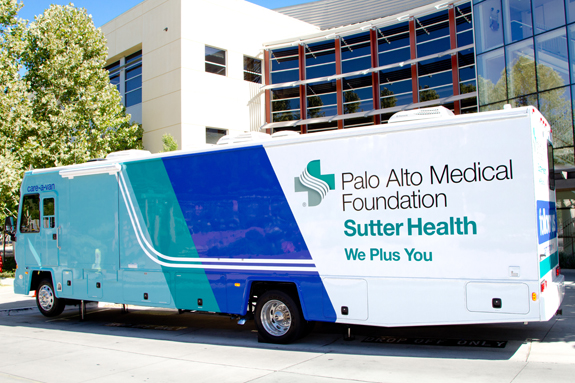Years ago, mobile clinics such as AmeriCares began a global mission to provide healthcare services in underprivileged places such as the slums of Mumbai. There running water was scarce and whole entire families shared teeny tiny rooms together. Around that same time, a Health Wagon began offering diabetes-related eye disease screenings to impoverished Appalachian folk, too. Flash ahead 5 years to today and there are now almost 2,000 mobile clinic programs in the United States to help out with patients that are uninsured, homeless, or disenfranchised according to the American Journal of Managed Care.
But, not all mobile clinics are serving the poor. One summer afternoon the Palo Alto Medical Foundation (PAMF), a nonprofit from the Bay area, came rolling through an unlikely part of Northern California. Their vehicle, which they some fondly called the “Care-A-Van”, parked in the parking lot of Nvidia corporate headquarters, a company that is a leader in producing GPUs (graphic processing units) located in Santa Clara. The average annual income of employees in this vicinity– about $130,000.
This Care-A-Van serves some of the Silicon Valley’s biggest names in the game. eBay, PayPal, SanDisk, VMware, and Juniper just to name a few. These employers of course are all employed mainly by staff under 40 with high levels of education, top-notch health insurance, gyms on-campus and rigorous health programs. At first it was expected that the mobile health unit would mainly deal with routine diagnoses such as headaches. However, they soon realized that they would be handling a lot more serious health concerns for these workers.
The Silicon Valley workers have bodies that don’t match their young age. A deadly mix of stress, lack of sleep, poor diets and sedentary lifestyles were causing alarming health issues. For example, computer programmers in their early 30’s are getting struck with severe degenerative arthritis from diets high in carbs/sugars as well as curved spines from endless hours of bad posture. Curved spines, potbellies, and increased risk for diabetes and heart disease run rampant.
Remember in college hearing that everyone gains that “freshman 15” from processed foods, Redbull, long-nights and even relying on Adderall to get papers in on time? Well in the Bay area, it’s known as the “Facebook 15” or the “Twitter 20.”
The on-duty mobile physicians and professionals serving these Silicon Valley dwellers have noticed some pretty intense issues over the two-year span that they’ve been working with them. They have diagnosed heart attacks, mental-health problems such as chronic anxiety and stress, full-on depression and irritable bowels. Physical activity seems to be low for these workers, too. Muscle pain and backaches have ensued as well due to the countless hours spent doing repetitive actions. And, although they are all living in a beautiful climate with about 260 sunny days a year, many of the patients that are being treated are suffering from deficiencies in Vitamin D.
But, why haven’t physicians noticed these extreme health concerns for tech-industry employees despite nearly all of the Care-A-Van’s patients having great health insurance? Honestly, it’s because they just don’t have the time to take out of their day for check-ups. And, even if they do, they’re likely still glued to their smart phones during their examination. In fact, 40% of these young tech employees don’t even have a primary-care physician.
“People are coming in asking me to fill a combination prescription: Ritalin and Xanax. One so they can perform during the day and the other to knock them out at night,”executive director of the Silicon Valley Employers Forum, Lisa Yee, who handles HR-benefits for over 40 of their local companies including Yahoo and Adobe.
It seems that these 18-hour workdays in high pressure environments are really taking a toll of Silicon Valley’s brightest talents. Traditionally, it was only jobs that were in seen in labor intensive workplaces or among impoverished communities. Perhaps instead of these companies wasting money on fitness and health programs that go unused, they invest more in the physical and mental well-being of these employees by letting them have a day off once in a while.

